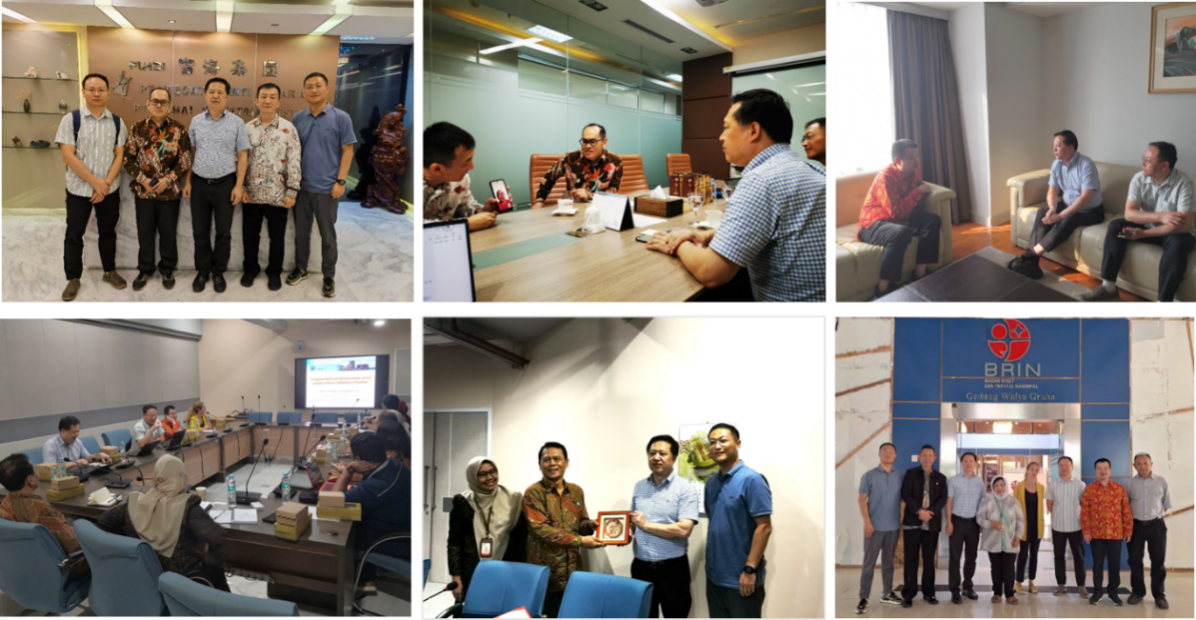On June 17, Prof. WANG Yin's research team visited Jakarta, Indonesia, and held in-depth discussions with PT. Fuhai Industrial Estate, the international cooperation partner of the ANSO project on “Technology R&D and Application Demonstration for Sustainable Development of Biomass Waste Recycling in Southeast Asian Countries”. The discussions covered the recent carbonization technologies of biomass (e.g., coconut shell) in Indonesia, the demand for biochar in Asian countries like China, as well as the potential for promoting the application of ANSO project technologies in Indonesia. Additionally, Indonesia's palm oil industry is also highly developed, with the main palm tree plantations located in Sulawesi and Sumatra. At present, the palm shells are mainly used as fuel, while the palm oil residues are primarily used as animal feed. Both parties further discussed the feasibility of using palm shells to produce activated carbon. Although the performance of activated carbon produced from palm shells is not as good as that from coconut shells, through the adjustments of process technology, it is also possible to produce high-performance activated carbon from palm shells.
From June 18 to 20, the research team led by Prof. WANG visited Manado, one of the major coconut production areas in Indonesia, to conduct on-site investigations related to coconut planting, coconut meat separation, and coconut shell carbonization. The investigation of multiple factories revealed that local Indonesians primarily use pit or waste oil drum smoldering to prepare biochar, resulting in uneven heating and incomplete carbonization. Additionally, the existing production factories in Manado are relatively small in scale. The production facilities are also primitive and widely distributed in the rural areas of Manado. The technology and equipment developed by Prof. WANG's team for the production of biochar and activated carbon can effectively solve the problem of poor quality of the locally produced biochar.
On the morning of June 21, the research team led by Prof. WANG visited PT. Fuhai Industrial Estate. Through a combination of online and offline methods, they had detailed discussions with professionals in the biomass industry on the following topics: the economic viability of producing activated carbon from raw materials like palm shells and coconut shells, the pathways for collecting and transporting the raw materials, the basic requirements for the promotion and application of activated carbon production technologies and equipment, and the potential for collaboration with local coconut and palm processing enterprises. Furthermore, they had in-depth discussions on the future high-value utilization of activated carbon. Both parties clearly defined the goals and models for future cooperation projects, and preliminarily formulated an implementation plan. PT. Fuhai Industrial Estate also expressed a strong willingness to revisit China, which the team welcomed and arranged a visiting schedule accordingly.
On the afternoon of June 21, Prof. WANG’s team was invited to the Indonesian National Research and Innovation Agency (Badan Riset dan Inovasi Nasional, BRIN) to hold a meeting discussion on the theme of high-value and low-carbon utilization of biomass in Southeast Asia. The meeting was attended by senior researchers and special experts from BRIN, Dr. Delima Darmawan (member of the Indonesian Palm Oil Association and former Director General of the Directorate General of Plantations, Ministry of Agriculture), Mr. Agus Eko Nugroho (Chairman of Research Organization for Governance, Economy, and Community Welfare), Dr. Umi Mu'awanah (Head of Research Center for Economics of Industry, Services, and Trade), as well as researchers from the renewable resources and energy fields. Mr. Agus Eko Nugroho of BRIN extended a warm welcome to the team, and Dr. Umi Mu'awanah introduced BRIN and expressed the willingness to cooperate. Prof. WANG introduced the development of the Chinese Academy of Sciences and the ANSO international cooperation project, and Dr. LI Jie gave an exciting presentation on the production and application of activated carbon from biomass resources. Both parties engaged in friendly and in-depth discussions on the topics discussed. They also explored further possibilities for exchange, cooperation, and talent cultivation, such as dispatching young researchers and students between the two sides.
Overall, this visit to Indonesia has laid a solid foundation for promoting the application of the advanced biomass-derived carbon material (biochar and activated carbon) technologies and equipment developed by Prof. WANG's team under the ANSO project support in Indonesia. It has also established connections between the Institute of Urban Environment, CAS, and BRIN, providing a solid basis for future cooperation in talent cultivation, academic exchange, research collaboration, and international project applications.
This trip fully demonstrates the complementarity between China and Southeast Asian countries in scientific research, technology promotion, and application, which aligns well with the national "Belt and Road" policy.
Source: WANG Yin,Institute of Urban Environment,Chinese Academy of Sciences

